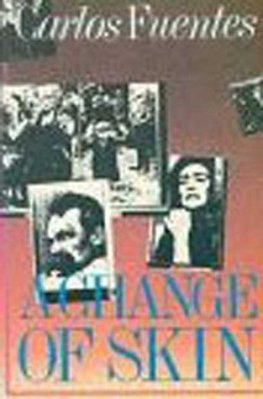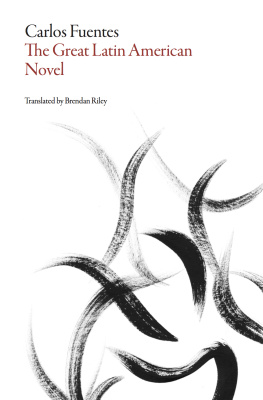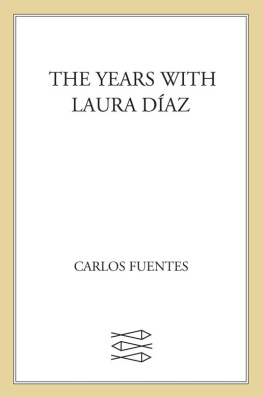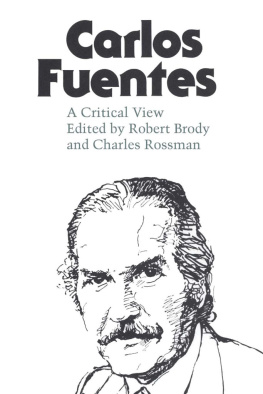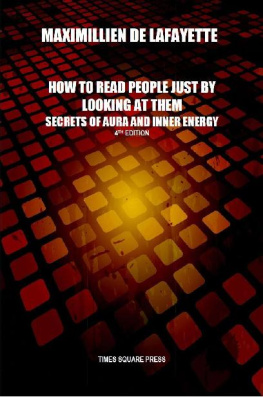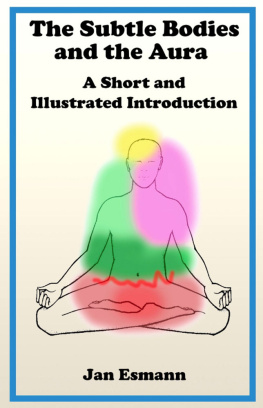Carlos Fuentes - Aura: Bilingual Edition (English and Spanish Edition)
Here you can read online Carlos Fuentes - Aura: Bilingual Edition (English and Spanish Edition) full text of the book (entire story) in english for free. Download pdf and epub, get meaning, cover and reviews about this ebook. year: 1986, publisher: Farrar, Straus and Giroux, genre: Humor. Description of the work, (preface) as well as reviews are available. Best literature library LitArk.com created for fans of good reading and offers a wide selection of genres:
Romance novel
Science fiction
Adventure
Detective
Science
History
Home and family
Prose
Art
Politics
Computer
Non-fiction
Religion
Business
Children
Humor
Choose a favorite category and find really read worthwhile books. Enjoy immersion in the world of imagination, feel the emotions of the characters or learn something new for yourself, make an fascinating discovery.
- Book:Aura: Bilingual Edition (English and Spanish Edition)
- Author:
- Publisher:Farrar, Straus and Giroux
- Genre:
- Year:1986
- Rating:5 / 5
- Favourites:Add to favourites
- Your mark:
- 100
- 1
- 2
- 3
- 4
- 5
Aura: Bilingual Edition (English and Spanish Edition): summary, description and annotation
We offer to read an annotation, description, summary or preface (depends on what the author of the book "Aura: Bilingual Edition (English and Spanish Edition)" wrote himself). If you haven't found the necessary information about the book — write in the comments, we will try to find it.
Aura: Bilingual Edition (English and Spanish Edition) — read online for free the complete book (whole text) full work
Below is the text of the book, divided by pages. System saving the place of the last page read, allows you to conveniently read the book "Aura: Bilingual Edition (English and Spanish Edition)" online for free, without having to search again every time where you left off. Put a bookmark, and you can go to the page where you finished reading at any time.
Font size:
Interval:
Bookmark:
CARLOS FUENTES
Translated from Spanish by Lysander Kemp. Copyright 1965 byCarlos Fuentes. Reprinted by permission of Farrar, Straus & Giroux. Inc.
Man hunts and struggles.
Woman intrigues and dreams;
she is the mother of fantasy,
the mother of the gods.
She has second sight,
the wings that enable her to fly
to the infinite of
desire and the imagination...
The gods are like men:
they are born and they die
on a woman's breast...
JULES MICHELET[1]
I
Youre reading the advertisement: an offer like this isn't made every day.
You read it and reread it. It seems to be addressed to you and nobody else. You don't even notice when the ash from your cigarette fal s into the cup of tea you ordered in this cheap, dirty cafe. You read it again.
"Wanted, young historian, conscientious, neat. Perfect knowledge col oquial French." Youth... knowledge of French, preferably after living in France for a while... "Four thousand pesos a month, al meals, com fortable bedroom-study." Al that's miss ing is your name. The advertisement should have two more words, in bigger, blacker type: Felipe Montero. Wanted, Felipe Montero, formerly on scholarship at the Sorbonne,[2] historian ful of useless facts, accustomed to digging among yel owed documents, part-time teacher in private schools, nine hundred pesos a month. But if you read that, you'd be suspicious, and take it as a joke. "Address, Donceles 815." No telephone. Come in person.
You leave a tip, reach for your brief case, get up. You wonder if another young historian, in the same situation you are, has seen the same advertisement, has got ahead of you and taken the job already. You walk down to the corner, trying to forget this idea. As you wait for the bus, you run over the dates you must have on the tip of your tongue so that your sleepy pupils wil respect you. The bus is coming now, and you're staring at the tips of your black shoes. You've got to be prepared. You put your hand in your pocket, search among the coins, and final y take out thirty centavos. You've got to be prepared. You grab the handrailthe bus slows down but doesn't stop and jump aboard. Then you shove your way forward, pay the driver the thirty centavos, squeeze yourself in among the passengers already standing in the aisle, hang onto the overhead rail, press your brief case tighter under your left arm, and automatical y put your left hand over the back pocket where you keep your bil fold.
This day is just like any other day, and you don't remember the advertisement until the next morning, when you sit down in the same cafe and order breakfast and open your newspaper. You come to the advertising section and there it is again: young historian. The job is stil open. You reread the advertisement, lingering over the final words: four thousand pesos.
It's surprising to know that anyone lives on Donceles Street. You always thought that nobody lived in the old center of the city. You walk slowly, trying to pick out the number 815 in that conglomeration of old colonial mansions, al of them converted into repair shops, jewelry shops, shoe stores, drugstores. The numbers have been changed, painted over, confused. A 13 next to a 200. An old plaque reading 47 over a scrawl in blurred charcoal: Now 924. You look up at the second stories. Up there, everything is the same as it was. The jukeboxes don't disturb them. The mercury streetlights don't shine in. The cheap merchandise on sale along the street doesn't have any effect on that upper level; on the baroque harmony of the carved stones; on the battered stone saints with pigeons clustering on their shoulders; on the latticed balconies, the copper gutters, the sandstone gargoyles; on the greenish curtains that darken the long windows; on that window from which someone draws back when you look at it. You gaze at the fanciful vines carved over the doorway, then lower your eyes to the peeling wal and discover 815, formerly 69.
You rap vainly with the knocker, that copper head of a dog, so worn and smooth that it resembles the head of a canine foetus in a museum of natural science. It seems as if the dog is grinning at you and you let go of the cold metal. The door opens at the first light push of your fingers, but before going in you give a last look over your shoulder, frowning at the long line of stal ed cars that growl, honk, and belch out the unhealthy fumes of their impatience. You try to retain some single image of that indifferent outside world.
You close the door behind you and peer into the darkness of a roofed al eyway. It must be a patio of some sort, because you can smel the mold, the dampness of the plants, the rotting roots, the thick drowsy aroma.
There isn't any light to guide you, and you're searching in your coat pocket for the box of matches when a sharp, thin voice tel s you, from a distance:
"No, it isn't necessary. Please. Walk thirteen steps forward and you'l come to a stairway at your right. Come up, please. There are twenty- two steps. Count them."
Thirteen. To the right. Twenty-two.
The dank smel of the plants is al around you as you count out your steps, first on the paving-stones, then on the creaking wood, spongy from the dampness. You count to twenty-two in a low voice and then stop, with the matchbox in your hand, and the brief case under your arm. You knock on a door that smel s of old pine. There isn't any knocker. Final y you push it open. Now you can feel a carpet under your feet, a thin carpet, badly laid. It makes you trip and almost fal . Then you notice the grayish filtered light that reveals some of the humps.
"Senora," you say, because you seem to remember a woman's voice.
"Senora..."
"Now turn to the left. The first door. Please be so kind."
You push the door open: you don't expect any of them to be latched, you know they al open at a push. The scattered lights are braided in your eyelashes, as if you were seeing them through a silken net. Al you can make out are the dozens of flickering lights. At last you can see that they're votive lights, al set on brackets or hung between unevenly- spaced panels.
They cast a faint glow on the silver objects, the crystal flasks, the gilt-framed mirrors. Then you see the bed in the shadows beyond, and the feeble movement of a hand that seems to be beckoning to you.
But you can't see her face until you turn your back on that galaxy of religious lights. You stumble to the foot of the bed, and have to go around it in order to get to the head of it. A tiny figure is almost lost in its immensity. When you reach out your hand, you don't touch another hand, you touch the ears and thick fur of a creature that's chewing silently and steadily, looking up at you with its glowing red eyes. You smile and stroke the rabbit that's crouched beside her hand. Final y you shake hands, and her cold fingers remain for a long while in your sweating palm.
"I'm Felipe Montero. I read your advertisement."
"Yes, I know. I'm sorry, there aren't any chairs."
"That's al right. Don't worry about it."
"Good. Please let me see your profile. No, I can't see it wel enough.
Turn toward the light. That's right. Excel ent."
"I read your advertisement..."
"Yes, of course. Do you think you're qualified? Avez-vous fait desetudes?"
"A Paris, madame."
"Ah, oui, ga me fait plaisir, toujours, toujours, d'entendre... oui...
vous savez ... on etait tellement habitue... et apres..." [3]
You move aside so that the light from the candles and the reflections from the silver and crystal show you the silk coif that must cover a head of very white hair, and that frames a face so old it's almost childlike. Her whole body is covered by the sheets and the feather pil ows and the high, tightly buttoned white col ar, al except for her arms, which are wrapped in a shawl, and her pal id hands resting on her stomach. You can only stare at her face until a movement of the rabbit lets you glance furtively at the crusts and bits of bread scattered on the worn-out red silk of the pil ows.
Next pageFont size:
Interval:
Bookmark:
Similar books «Aura: Bilingual Edition (English and Spanish Edition)»
Look at similar books to Aura: Bilingual Edition (English and Spanish Edition). We have selected literature similar in name and meaning in the hope of providing readers with more options to find new, interesting, not yet read works.
Discussion, reviews of the book Aura: Bilingual Edition (English and Spanish Edition) and just readers' own opinions. Leave your comments, write what you think about the work, its meaning or the main characters. Specify what exactly you liked and what you didn't like, and why you think so.

